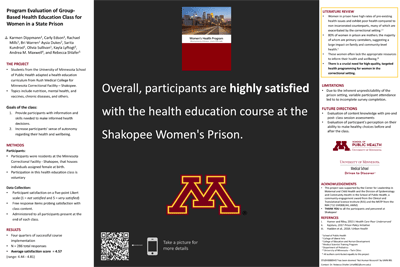Karmen Dippmann
MPH, Community Health Promotion
Co-Authors:
Karmen Dippmann, Carly Edson, Rachael Mills, Bri Warren, Aysia Dukes, Sarita Kundrod, Olivia Sullivan, Kayla Lyftogt, Andrea M Maxwell, and Rebecca Shlafer
Advisor:
Dr. Rebecca Shlafer
Educational Objectives:
- Describe the necessity for health education resources for individuals who are incarcerated.
- Explain the process of implementing a health education course at Minnesota Correctional Facility – Shakopee.
- Evaluate process measures collected throughout implementation of the course.
Keywords:
Incarceration, Health
Abstract
Background: Individuals who are incarcerated often lack the appropriate resources to inform their health and wellbeing (Hadden et al., 2018). Some facilities have implemented health education classes as a way to provide access to accurate health information. As a result, students from the University of Minnesota School of Public Health adapted a health literacy curriculum from Rush Medical College for Minnesota Correctional Facility – Shakopee, the only Minnesota state prison that houses individuals assigned female at birth. This curriculum covers a broad range of health issues, including nutrition, mental health, and vaccines. The goals of this curriculum are to 1) provide participants with information and skills needed to make informed health decisions and 2) increase participants’ sense of autonomy regarding their health and wellbeing.
Methods: Evaluation of this curriculum includes both quantitative measures of participant satisfaction on a five-point Likert scale (1 = not satisfied and 5 = very satisfied) and qualitative free response items probing satisfaction with class content. These measures have been administered to all participants present at the end of each class over multiple quarters.
Results: After four quarters of implementation (286 total responses), the average satisfaction score across all quarters averaged 4.57 (range: 4.44 – 4.81) indicating high satisfaction among participants. Additionally, facilitators have made ongoing improvements to the curriculum and have learned to navigate the prison environment in more effective, meaningful ways. Limitations include inconsistent implementation and variable participant attendance leading to incomplete survey participation, due to the unpredictable nature of the prison system.

View Poster (PDF)
